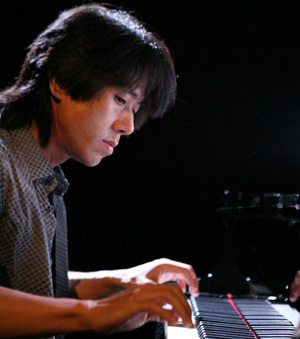For an exciting first half, Cutting Edge Concerts lives up to its name

Taka Kigawa performed at the opening concert of Cutting Edge Concerts’ New Music Festival Monday night at Symphony Space.
Cutting Edge Concerts is a puzzle. It presents new music, like Monday night’s opening of its 2017 new music festival. It’s also a frequent producer of the music of composer and conductor Victoria Bond, the artistic director of Welltone New Music, Inc., the organization which is behind Cutting Edge.
Bond is at the heart of the puzzle. Her music is new in that it is made in our contemporary times, but it expresses an aesthetic that would not be out of place in the late 19th century. And hers is not the only backward-looking music presented at these events.
So the scintillating first half Monday in the Leonard Nimoy Thalia at Symphony Space was both a surprise and a delight. The pianist Taka Kigawa played recent compositions by Richard Carrick, Zosha Di Castri, and Sean Shepherd, in an exciting and gripping serving of new music.
Kigawa is an exceptional musician, the kind who gives the impression he is delivering a definitive performance every time he plays. His physical facility at the keyboard is supported by a clear and intelligent view of the music, so that he makes even the most complex and abstract pieces sound logical, familiar, and sympathetic. That was the experience Monday night, with one compelling interpretation from him after another.
Carrick’s la touche sonore sous l’eau and Di Castri’s Dux presented considerable challenges and rewards. Like Debussy, Carrick explores what he calls the “bloom of sound” that grows out of sustained notes on the piano, with each new pitch manipulating the decaying frequencies. Playing through the dense weave of compact, abstract phrases that were reminiscent of Cecil Taylor, Kigawa’s touch and complete control of dynamics had the sonorities turning and twisting beautifully in the air.
Dux was based on canonic principles stretched to the extreme, most obviously the far left and right of the keyboard, the two edges that Kigawa reconciled. Kigawa bashed out dissonances and timbres at each end—the upper register was lightly prepared with painter’s tape—with such exact rhythms and purpose that the music sounded bracing and exciting yet never aggressive.
Fiery sections alternated with quiet ones, and an extended passage of obsessive minor key repetition was seductive and haunting. That mood carried over the Sean Shepherd’s three Preludes–relatively conventional compared to the previous two works but no less inventive or of-the-moment. After a false start in which Kigawa had to remember to remove the painter’s tape, the pianist delivered a gorgeous, graceful performance.
This was the most traditionally pianistic music, and one could hear Kigawa’s graceful articulation, each line pointing towards meaning. Shepherd’s Preludes also came out of Debussy, with a sly nod to Radiohead, and they balanced structure and freedom with elegance. They also succeeded as literal preludes, ending without resolution while sounding complete and self-contained.
The second half suffered, mostly, in comparison to the great first half. After intermission, the musicians were SONYC (String Orchestra of New York City), and they played The Trojan Women by Lisa Bielawa and Bond’s Frescoes and Ash.
The Trojan Women began as incidental music to Euripides’ play, with the mandate that it express different forms of grief. The three sections, “Hecuba,” “Cassandra,” and “Andromache,” were lovely and expressive and used songful means—a lead line with supporting harmonies and rhythms—with “Andromache” pressing the issue through long, slow glissandos.
Dynamically played by SONYC, the music was satisfying without matching the level of interest and excitement of the first half.
The concluding Frescoes and Ash, based on images from Pompeii, felt out of place. The music was pictorial and melodramatic, the only modern signifiers being glances at Bartók, Glass, and Bernard Herrmann. One section, “Chiron Teaches Achilles to Play the Lyre,” was a well-crafted dialogue between bass and cellos, but the rest of the music was literal and obvious, the virtual opposite of cutting edge.
Cutting Edge Concerts’ New Music Festival presents “Offbeat Operas” from William Anderson, Frank Brickle, and Victoria Bond, 7:30 p.m. May 1 at Symphony Space. CuttingEdgeConcerts.org